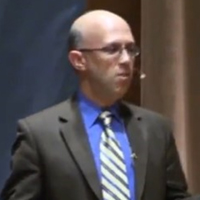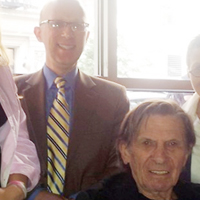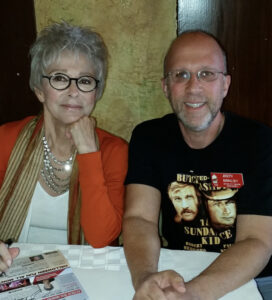Independent financial advisors often find themselves in conversations with clients about their health or advance directives, but Joseph Z. Kowalsky of Upstream Investment Partners has a unique interest. Aside from his profession, he’s an advocate for research in cryogenics — the science of preserving tissues and organs at ultra-low temperatures for lifesaving purposes.
Kowalsky, who sits on the volunteer board of directors of the Cryonics Institute, notes that 80% of lungs, for example, available for transplantation have to be disposed of because there is not enough time for the right organs to reach the right recipients.
And, as a person with a lifelong interest in science, that fact is not acceptable to him.
To spur interest and investment in organ transplant research, Kowalsky developed the Cryoprize, short for the Organ Cryopreservation Prize. “I am dedicated to a lifelong endeavor to someday find a way to help humanity through the Cryoprize,” says Kowalsky, based in Lathrup Village, Mich.
The Cryoprize is separate from, and unrelated to, the Cryonics Institute, Kowalsky noted. “It is under the auspices of an entirely unrelated 501(c)(3) charitable organization. I have largely moved my focus to organ transplant research because I think it is both urgently needed, and is a necessary stepping stone to cryonics. While I remain on the (volunteer) Board of Directors of the Cryonics Institute, most of my volunteer effort is now with the Cryoprize.”

Kowalsky hopes the prize will lead to organ transplants becoming safer, less costly and more available. The website aims to raise money through donations so that a minimum $50,000 prize can be awarded “to any individual or group that is able to place one of several mammalian organs at cryogenic temperatures, transplant the organ into a mammalian animal for a period of at least nine months, and show, during that time period, proper clinical function of the organ. The organs in question are the heart, lung, kidney, liver and pancreas.”
In a short video at the site, Kowalsky reads the daunting statistics: The window for successful transplantation of major organs is 36 hours for a kidney, 12 to 16 hours for a liver, under eight hours for a lung and 6 hours for a heart.
Other research supports this information. According to a research paper on Science.org, “despite advances in surgery and organ preservation technologies, about 70 percent of organs suitable for transplant are discarded. One critical reason is exceeding preservation time limits in taking organs from donors to potential recipients.”
According to the American Transplant Foundation, approximately 850,000 transplants have occurred in the United States since 1988. Almost 107,000 people in the U.S. are currently awaiting a lifesaving organ transplant.

A few years ago the actor Leonard Nimoy lent his support to the Cryoprize. Through winning an auction to have drinks with Nimoy, Kowalsky had a chance to have a long conversation with the “Star Trek” legend and he became a supporter of the prize.
They hit it off immediately, Kowalsky says, and for a childhood “Star Trek” fan it was a momentous meeting. Nimoy’s death in 2015 left an empty spot for what the Cryoprize needs — a patron who can bring a wider audience to hear its message.
Kowalsky says he is reaching out to other celebrities who might support the cause. But then he meets his old adversary: time. In fact, Kowalsky jokes that he does his volunteer efforts for The Cryoprize in his “spare time —from 2 to 5 a.m.!”
One way everyone can help The Cryoprize, he says, is to purchase items from Amazon through its Amazon Smile program. The company donates one half of 1% of eligible purchases to a designated cause, which can include the Cryoprize, which is currently listed under the Immortalist Society charity. Just visit smile.amazon.com and sign up for the charity.
An ‘Ambulance to the Future’
Kowalsky, 57, says his interest in science developed when he was very young. He believes it probably is related to his mother, Cherna, watching ‘Star Trek’ with him in the late 1960s and because his father, Eugene, was a science teacher. By the time he was in fourth grade, he started a science club with some friends. His special interests include physics and time sciences, which includes time travel.
The sense of time and the passage of time loom large for Kowalsky. “Since I was little, I did not understand why life is so short. I remember thinking about it when I was about 8 years old: ‘Soon I’ll be done with the school year, then elementary school, then high school …’ The typical ‘grow up, go to college, get married, have children, move to Florida, die’ just did not seem to be … enough,” he says.
Although the death of his maternal grandfather, when Kowalsky was just 13 years old, had a big impact on him, the death of his paternal grandfather, before Kowalsky was born and for whom he is named, may have had an even bigger one. “He was 55 years old and needed one heart bypass in 1963. But they did not know how to do that,” Kowalsky said. “Had they been able to cryopreserve him for five years — an ‘ambulance to the future’ is how we think of it — he might be alive today.”
Kowalsky recalls that around that time his uncle gave him a magazine on cryonics. His uncle had received it in the mail and he knew his nephew was interested in science. Kowalsky then asked his science teacher for more information.
“I was in a religious Jewish school at the time — in 7th or 8th grade — so she asked my parents if it would be OK. They said sure. And I have been involved ever since. I was at that time the youngest person involved with the Cryonics Institute. Today I am an ‘elder statesman.’”
Investing, Politics, Law, Advising
Kowalsky holds a degree in economics, magna cum laude, from Wayne State University and a juris doctor from the University of Michigan Law School.
He has been studying investments since he was 15 years old and for two years wrote a securities newsletter for friends and family. He was a financial consultant for other firms before starting his own advisory practice, which includes complex stock and bond investing, as well as life and long-term-care insurance, among other things. In 2010, at the request of his clients, he began to offer discretionary accounts. Also in 2010 he decided that he could better serve his clients as an independent advisor and was one of the first to join the newly formed Upstream Investment Partners. He has clients in 15 states.
But at the beginning of his career, Kowalsky focused on politics and worked on Capitol Hill for Sen. Carl Levin of Michigan while in his late 20s. And he also knew the late Sen. Bob Dole.
“Both of them continued to devote themselves to causes of importance and to our country into their 80s and 90s,” Kowalsky says.
Levin died in July of 2021, and Kowalsky praises him as an “honorable, decent and concerned person.”
Kowalsky was in touch with Dole, of Kansas, a few months before he died in December 2021 when he wrote to him regarding an issue about fairness in debates.
As different as Levin (a Democrat) and Dole (a Republican) were in their political beliefs, they respected each other, according to Kowalsky.
“Two honorable gentlemen from ‘opposite sides of the aisle’ are gone. I worked for Sen. Levin who often respectfully disagreed with Sen. Dole. We need to learn from their lives and legacies,” Kowalsky says.
He adds that a favorite quote of his by Dole was a gibe he took at the “all or nothing” rookie Republicans who had ridden the 1994 midterm GOP wave into Congress: “In politics, honorable compromise is no sin. It is what protects us from absolutism and intolerance.”
Kowalsky also worked on the Presidential Transition Team of Bill Clinton (although he supported late Massachusetts Sen. Paul Tsongas for the 1992 primary). Kowalsky clerked for the Federal Trade Commission in its Anti-Trust Division.
Making A Living
After politics, Kowalsky founded a law practice in Michigan and developed Tomorrow Inc., a 501(c)(3) nonprofit law clinic, as a way to help clients on a sliding-scale payment basis.
One year he earned $9,000 in his pro bono practice, he recalls. “I had as many as five people who worked for me in this venture who made more per hour than I did,” he says.
Kowalsky recalls that he eventually “needed a job that supported me.”
As a senior financial consultant, Kowalsky says he has a diverse client base and has a holistic approach to advising clients: “My youngest clients are in their 20s and my oldest in their 80s. I have had clients as young as 15 years old and as old as 104. Currently the majority of my assets under management are for retired clients, though the majority of my clients are younger than that.
“There was a firm with which I once interviewed whose tag line was ‘Do you have enough?’ That really bothered me because I got the impression that they were referring only to money. There is a Jewish proverb (Ethics of the Fathers) ‘Who is the rich man? The one who is satisfied with his lot.’
“With that proverb in mind, I believe that my job is twofold: 1. To know my clients as well as possible — this includes not just their finances but their family, their philosophy of life, their political views, their health situations — everything that they are willing to discuss. In short, to listen. And 2. Based on that and my knowledge and research, to give advice that I think will benefit them the most financially and in life.
“I make it very clear that advice I give on finance, health, kids, education — whatever it might be — is my opinion based on study. I do not pull any punches when I think something is important for them to do, especially financially, but also that it is their life and they must tell me what helps them to sleep at night.”
Kowalsky adds he largely does his own research rather than delegating it to a third-party manager.
“I do use some mutual funds, but I also research companies (including MLPs, BDCs, REITS, etc.) I am an old-style value manager. I look for companies that are performing and which I think will perform over time. I do not care if the stock price remains low or stagnant — or goes down — for several years, so long as the company is thriving. The goal is that most company shares in that situation will be discovered and move up to what I think is an appropriate valuation.”
Kowalsky also explained how his relationship with Upstream Investment Partners developed. He was working for Ameriprise which had bought out the former H&R Block Financial Advisors where he had worked for several years.
“My former regional manager, Steve Belloli, a smart, experienced, wonderful guy — someone I have great respect for — had left when Ameriprise took over.”
Kowalsky called him but Belloli had a non-compete clause for a time and he could not help him.
“The day after the non-compete clause expired I called him back and he told me that he and two other former regional managers (Craig Freund and Jon Holmes) were founding Upstream Investment Partners. I became Upstream Rep No. 4 (they were 1, 2 and 3),” Kowalsky recalls.
He said that Upstream is an association of independent advisors offering two programs. For a small fee, they will provide a “plug and play” office: the office, equipment (computers, printers, phones, copiers), support staff etc. For Kowalsky, he can do that himself and affiliates with Upstream at no cost.
“Upstream has a compensation agreement with our broker-dealer, Sigma Financial Corporation. Its principals have researched the available broker dealers so that I do not have to. Their choice of Sigma has been absolutely wonderful — an unqualified two thumbs up. Upstream has also negotiated great rates for our phone system and our computers, among other things. It now has more than 150 reps in multiple states, so the Upstream name is getting well known,” he says.
A Bit of Down Time

On a recent Sunday evening, Kowalsky was taking a few hours to make bread in his bread maker. It’s one of his avocations, as is his dedication to his two rescue cats and sheltering stray cats who frequent his yard in a “cathouse” he’s constructing. He also volunteers at the 1920s-era Redford Theatre in Detroit, as an emcee, and on the steam locomotive that the book and movie “The Polar Express” is based on. The locomotive is run by the Steam Railroading Institute, a 501(c)(3). The Redford Theater is owned and operated by the Motor City Theatre Organ Society, an all-volunteer 501(c)(3).
But getting on with his other work — The Cryoprize — is never far from his thoughts.
It will take time to achieve his goals in that arena, he notes. But Kowalsky says people who succeed in their goals may fail many times and must have the patience to persevere. “It takes getting up after getting knocked down — sometimes over and over. Stubbornness, determination.”
And he doesn’t believe in saying that he can’t do something.
“I just can’t do it yet,” Kowalsky says.
Patricia McDaniel is a freelance writer and editor and former journalist with Gannett’s New Jersey newspapers. She can be reached at pmcd5353@gmail.com.
Note: Joseph Z. Kowalsky, JD, AIF, is a senior financial consultant, Upstream Investment Partners LLC, 28250 Southfield Road, Suite 210, Lathrup Village, MI 48076; 877- 255-1949. Upstream offers securities through Sigma Financial Corp. and fee-based investment advisory services through Sigma Planning Corp, a registered investment advisor. Upstream is independent of both.







